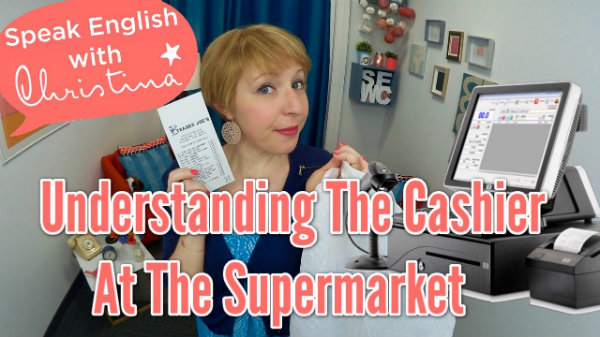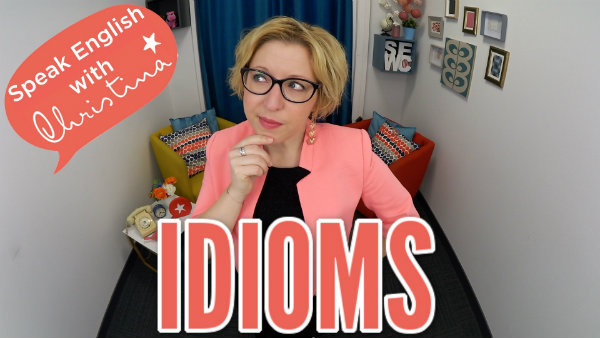
Hi there! I’m your English coach Christina, welcome to Speak English with Christina, where you’ll learn American culture and business know-how to become confident in English.
You know what’s frustrating when you learn a language?
When you reach the point where you feel like you’re not improving. It’s like you’re blocked. You really want to improve, and you know you need to, but… you just can’t move to the next level.
How do you get from intermediate to advanced? We’ll see how today.
Let’s go!
If your goal is to practice speaking…
A big part of improving is to practice speaking, but with a structured designed to improve your fluency. And next week, the conversation theme in my Faster Fluency Conversation Club is… How to set goals and improve yourself!
Watch this episode to see how to set your goals and improve to an advanced level, then join us in the Fluency Club to apply what you learn and make real progress.
But first, here’s what you need to know about why you’re stuck at intermediate today. Don’t worry… it’s normal.
The better you are in English, the harder it is to improve
Here’s some news, which will either reassure you or make you go “Argh!!!” The better you are at English, the harder it actually is to improve.
It’s unfair, I know. But it’s actually a real concept called “the intermediate plateau”, and I did an entire episode about it, that I suggest you watch to feel better about why you’re blocked. It’s normal, but there is hope!
Another bit of news that is both “Yay” and “Argh”: Linguists estimate that in order to understand 95% of everyday texts, you only need 3000 words. That’s not very many, in reality.
But, the average native speaker has the ability to use 20,000 words. 3,000… 20,000… That’s a big difference. So you can survive well with 3000 words, but to get to those higher levels…
Well, we’re going to have to work on your vocabulary. And speaking of vocabulary…
Chunks, idioms, phrasal verbs, and collocations
Students tell me this all the time “I don’t have enough vocabulary”… and they’re right! Often, it IS lack of vocabulary that keeps you at your intermediate level.
So, you need to …build your vocabulary. OK, you know that already. But what you may not know is that they key to sounding more advanced is to speak with the chunks, idioms, phrasal verbs, and collocations that native and advanced speakers use.
This is much more efficient than learning individual words, because these are the true building blocks of fluid conversations. They make you sound more natural.
But how do you learn chunks? You have to be like a detective, to notice the expressions in the English you read or hear.
And every time you hear or see an expression and think “Oh, that’s how they say it in English!” or “Hmm, I don’t understand this expression”, well, maybe you’ve found a chunk!
You can then search for it on google with quotes around it, and see if it is indeed a common chunk!
And a good place to start learning some of these chunks will be with past episodes like “American Corporate Jargon”, “Understanding the cashier at the supermarket” or “5 everyday idioms in real American English.”
After you notice these expressions, it’s time to practice!
Practice, practice, practice
When you start noticing vocabulary and chunks, the next thing you have to do is practice using it in conversations on that topic, to integrate it into your English.
That’s why, in my Faster Fluency Conversation Club, each week you have ONE designated conversation theme, exercises and activities to learn vocabulary about that theme, and then 3 conversation sessions that week, to talk about the theme and use all of your new vocabulary!
Like next week, the Fluency Club conversation theme is “Goals and productivity”. Club members are going to get some activities this weekend to help them get vocabulary on that theme, and then next week, on Monday, Tuesday, and Friday they’ll practice talking about the theme, using their new vocabulary.
The key here is not just to practice speaking about many different random things. It’s structured, focused practice, to move you closer to your advanced level, step by step. It’s not the quantity of practice that you do, it’s the quality of your practice that makes the difference.
Let’s recap
So here’s what you need to remember about getting from intermediate to advanced English.
- First, just know that it’s normal to be on the intermediate plateau. It happens to even the best students.
- Then, focus on increasing the chunks, expressions, and idioms in your vocabulary to sound more natural. To do that, it’s important to notice them, note them, and practice using them.
- For this, structured, focused conversation practice to integrating them into your English, like in my Faster Fluency Conversation Club.

Now, what about you?
What tips do you have for reaching your goals in English? What practices work for you?
Share your tips with us in the comments, and let’s all help each other become better in English.
Don’t try to improve alone… We’ll help you improve faster!
If you want to apply the techniques you learned in this episode, join my Faster Fluency Conversation Club!
Next week, our discussion topic is “Productivity and goal setting”, so it’s perfect for determined, motivated students like you.
You’ll get activities to help you increase your vocabulary, and live speaking practice with other motivated members of the Speak English with Christina community, and our Fluency Club leaders Cara and Trisha.
You can get all the details on how to join here: https:/join-faster-fluency-conversation-club/
Thank you for learning with Speak English with Christina, and I’ll see you next time!

More good stuff...
Click the image to learn more








I like your English lessons very much!
I want to learn and speak very good English for my future.
Thanks for this lesson. It was really helpful.
Regards from Venezuela 😉